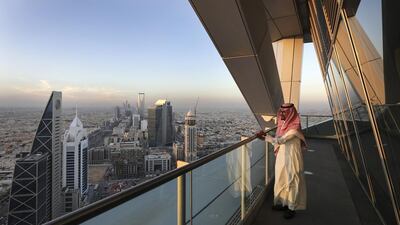In November, Mena market delivered 9 per cent return on the back of a sharp rally of 18 per cent in Saudi Arabia. The strength of the Saudi rally has surprised us given the macro environment, volatility in oil price, unexpected US election result and outflows from emerging markets.
The rally began after Saudi Arabia successfully raised US$17.5 billion from international bond markets, which was followed by a government announcement with regard to release of 100bn Saudi riyals (Dh97.93bn) in overdue payments to contractors and counterparties by year end. The move is expected to dilute cost of risk concerns for the banking sector; liquidity seems to be improving as indicated by softening Saudi Arabia Interbank Offered Rate (Saibor).
Among the regional markets, the UAE has been an outperformer on a relative basis, however, in November the Saudi market took centre stage. On a year-to-date basis, UAE and Saudi markets have given 2 per cent returns. The UAE resiliency versus Saudi vulnerability argument tactically appeared weaker after positive news flow from the latter. The recent underperformance of UAE markets was partially driven by weaker emerging market flows and lack of fresh catalysts locally. However, the differentiation for the UAE market lies in its stable fundamentals and diversified economic base.
The Opec meeting finally closed on a positive note with members agreeing to reduce oil supply by 1.2 million barrels per day and non-Opec members expected to reduce oil supply by 600,000 bpd. With oil prices moving above $50 per barrel, we think it is a positive development for the Mena markets as it can balance the oil market in 2017. However, actual implementation of the deal remains the key.
The outcome of the US election was contradictory to what media polls were indicating; it was a clean sweep by the Republican candidate, Donald Trump. Interestingly, the US equity market reacted positively, contrary to market expectation of a 5 per cent to 10 per cent correction. Mr Trump’s election manifesto has revolved around domestic trade protectionism and pro-growth policy driven by higher fiscal spending. We think, domestic trade protectionism polices might hinder exports from emerging markets and in turn the growth in emerging markets.
On the other hand, pro-growth policies might lead to higher inflation; the sharp rise in US 10-year treasury yield by nearly 60 basis points to 2.38 per cent after election results seems to be reflecting potentially higher fiscal deficit and higher debt scenario. We think it is premature to conclude on the effect of Mr Trump’s likely policies.
Feedback from our company management meetings attended last month largely centred around restructuring, benefits from Saudi Arabia’s reform plan, deleveraging and cost savings rather than growth. In Saudi Arabia, most companies expect fuel and utility prices to move higher from next year and are already budgeting for the same.
In the UAE, the state of affairs for the banking sector is not expected to change materially for next year, except margins, which should improve, driven by lower funding costs. We expect banks to benefit from Expo 2020 spending, which is expected to start from next year.
The UAE real estate sector has been broadly weak this year, however, companies to which we have exposure in our funds and portfolios have fundamentally outperformed and delivered successful property launches. Real estate companies are expected to deliver high single-digit growth in earnings on the back of existing backlog of development properties.
For Egypt, a highly awaited devaluation and increase in interest rates came through last month. The central bank of Egypt decided to float the currency to ease a dollar crunch and kick-start the investment cycle in the economy. The Egyptian pound weakened by more than 102 per cent to 17.90 pounds versus the dollar after the currency was floated. To counter inflationary pressures, the central bank increased interest rates by 300 basis points. The IMF and World Bank welcomed the move by Egypt as it secured part of the $12bn loan from IMF.
Going forward, we think stability in oil price, expected US interest rate hike, fourth-quarter earnings season, Saudi budget and dividend announcement will be the key events for the market. In Saudi Arabia, the budget could further include subsidy cuts and austerity measures, which would have a negative read across for corporate profitability for 2017. We expect the Saudi market to take a breather after such a strong performance, valuations have moved higher from a low base, further re-rating of the market would require earnings growth to pick up. But many companies in the UAE are trading at an attractive dividend yield of more than 5 per cent with valuations providing an excellent entry point.
Saleem Khokhar is the head of fund management at National Bank of Abu Dhabi.
business@thenational.ae
Follow The National's Business section on Twitter

